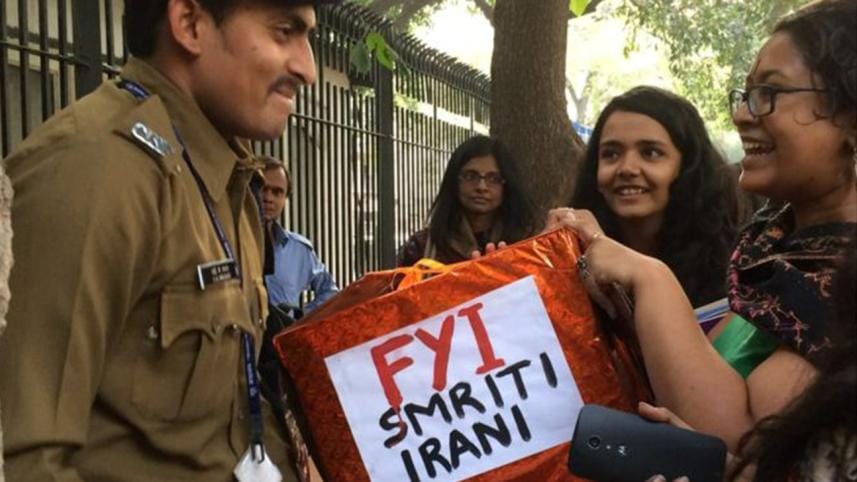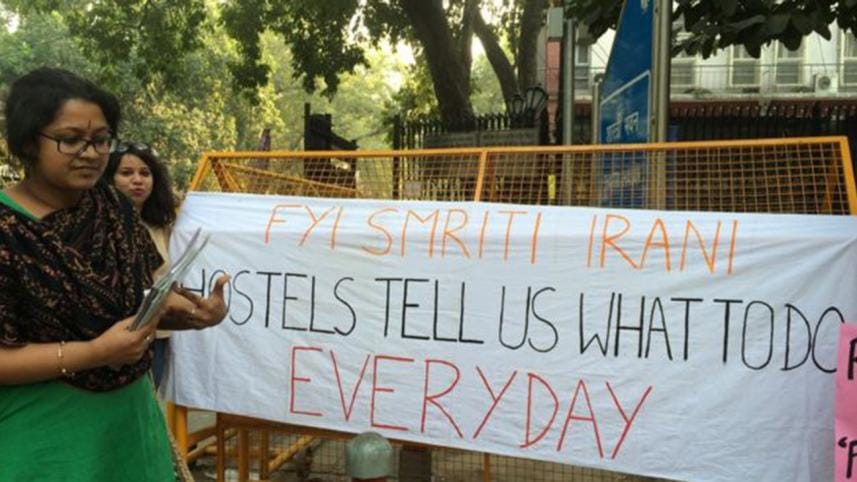Indian women educate 'ignorant' minister

A group of female students and women's activists in the Indian capital, Delhi, have come up with a unique response to minister Smriti Irani's declaration that women in India have complete freedom to decide what to wear or whom to meet. The BBC's Geeta Pandey in Delhi reports.
"In India, I don't think any woman here is dictated what to wear, how to wear, whom to meet, when to meet... I am of the opinion, I don't think anybody is dictated here, you are not told," Smriti Irani said while interacting with New York-based journalist Tina Brown at the Women in the World summit in Delhi last week.
Irani, a former television actress, is a high-profile cabinet minister who heads the Human Resource Development (HRD) ministry which governs schools, colleges and universities in India.
As some in the audiences jeered and booed her, she feigned surprise: "Are you told? I am sorry. I am not. My apologies ladies."

Her comments have left many wondering why she is feigning ignorance about gender discrimination in India.
All across the country, girls and women are constantly told by parents, husbands, in-laws, other relatives, neighbours, teachers and hostel wardens what they can - and can't - wear, or do.
In many rural communities in north India, powerful khap panchayats (village councils) often issue diktats to the tune of telling young women that they can't wear Western clothes, carry mobile phones or talk to young men.
Many of Irani's colleagues - as well as politicians from rival parties - have also been in the news recently for making all sorts of misogynistic statements.
So obviously, her comments have caused much consternation among the protesters - many of them university students - who accuse the minister of burying her head in the sand.
"The women's hostels in the universities (that Irani governs) tell women what to do every day: they tell us where to go, when to go out, whom to meet, where to meet or stay, what to eat, what to wear, when to talk, whom to love," said 24-year-old sociology student Avipsha Das.
"We can't even put a poster in our room without their approval. The list is endless," she added.
Das and the other protesters are also part of a campaign called Pinjra Tod - or Break the Cage - and are fighting against "bizarre and patriarchal" restrictions imposed on female hostellers.
On Tuesday afternoon, some of them gathered outside Irani's office in central Delhi - they read from the hostel rule books, sang songs and raised slogans, watched by policemen and paramilitary soldiers who had no idea how to deal with such feisty young women.
Before leaving, the protesters left a gift box containing rule books from their hostels for the minister to read.
"In a country where women are regularly subjected to intense discrimination and societal pressures, it is very unfair for a woman minister to make such remarks," Das said.
"This is a precious present of knowledge and information for the minister, and we hope that she will be wiser after reading them," she added.



 For all latest news, follow The Daily Star's Google News channel.
For all latest news, follow The Daily Star's Google News channel.
Comments